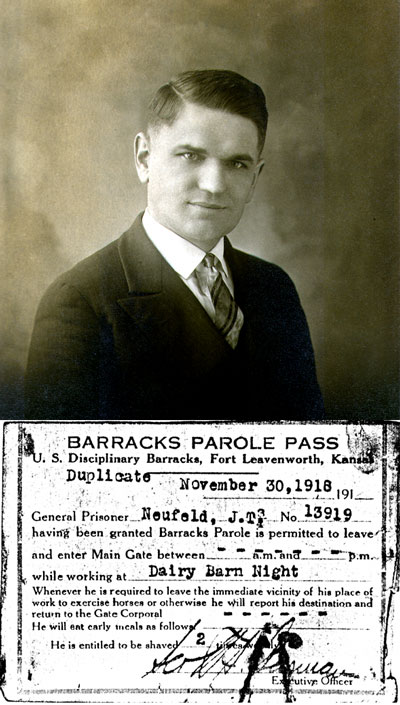Oral History Interviews
 |
|
John T. Neufeld with parole pass: from the private collection of Ernest Neufeld, Public Domain |
Oral History Interviews with World War One Conscientious Objectors (selected excerpts), Sourcebook, Joint Effort of the Schowalter Oral History Collection of Bethel college and Mennonite Central Committee Peace Section, Printed by Mennonite Central Committee, 1986.
Harry Charles
Excerpted from Proceedings of a General Court-Martial which convened at Camp Travis, Texas, June 7, 1918. Available in Schowalter Oral History Collection, Henry J. Becker file. Charles and 41 conscientious objectors at Camp Travis were accused of violating the 64th Article of War, refusing to obey the order to wear the uniform. Charles spoke on behalf of the 41 defendants. Sourcebook, pp. 69-79
Jesse Hartzler
Excerpted from a transcript of taped interview with Jesse D. Hartzler, Roger Golden, Interviewer, December 6, 1968. Hartzler was drafted and arrived at Camp McArthur, Texas, Sept. 7, 1918. He was given a mock trial, beaten and put on bread and water. He remembers sympathy and kindness from some soldiers and officers. Hartzler was court-martialed Nov. 16 and sent to Fort Leavenworth, Kansas. He was released Jan. 7, 1919. Sourcebook pp. 151-160.
George Miller
Excerpted from a transcript of a taped interview with George S. Miller, Roger Golden, Interviewer, December 18, 1968. Miller had to enlist at Camp Dodge, Iowa July 23, 1918. Non-commissioned officers in his company treated him harshly...He was court-martialed on Armistice Day and set to the disciplinary barracks at Leavenworth, Kansas on Christmas Eve. He spent some time in solitary confinement fro refusing to work. He was discharged May 1, 1919. Sourcebook pp. 161-169.
Cornelius Voth
Excerpted from a taped interview with Cornelius Voth, James C. Juhnke, Interviewer, June 9, 1968. Voth was drafted August 5, 1918, and was courtmartialed October 31, 1918 and sent to Ft. Leavenworth, KS. He firmly believed...he was completely within the law when he refused miliary orders because he would have been willing to take a farm furlough. Sourcebook pp. 5-29.